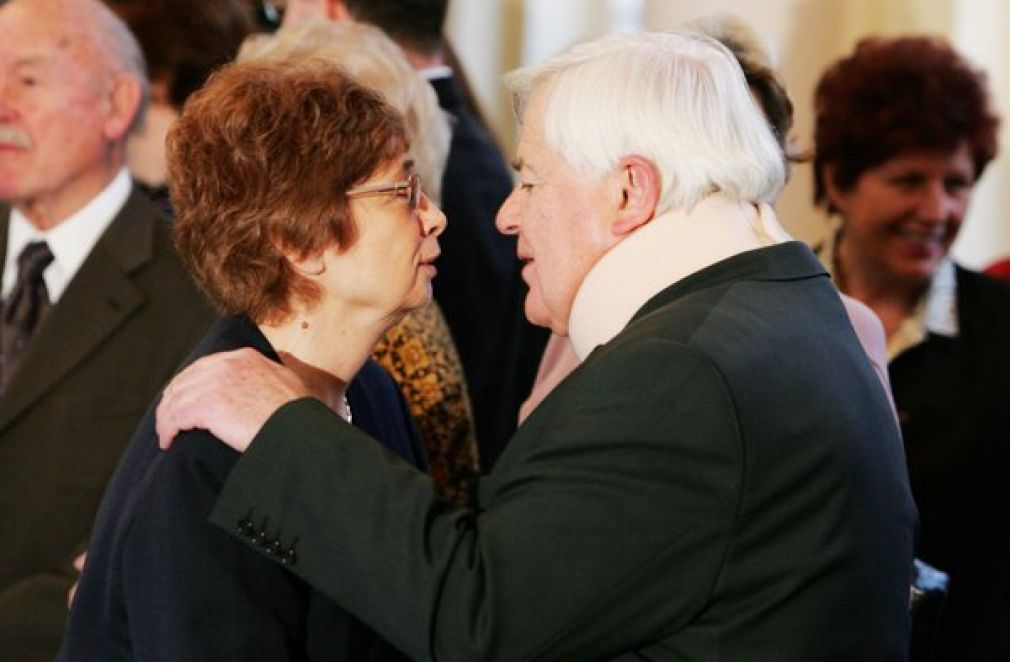By: Ana Horvat (Nova24tv.si)
Instead of establishing European security architecture as a priority for every European, which is a necessary precondition for Ukraine to regain control of all its territories occupied by Russia, there are still some who find excuses for the actions of Russian President Vladimir Putin and blame the “ugly” West for everything. Among them undoubtedly falls Spomenka Hribar, who cannot seem to refrain from spreading her Russophilia among the people. This time, she served a new piece in Delo newspaper, filled with clichés, and she could not resist perpetuating the myth of Mikhail Gorbachev’s famous promise of not expanding NATO, which Russophiles often use to accuse the West and the capitalist world.
Spomenka Hribar, along with Milan Kučan, is considered one of the most prominent Russophiles in Slovenia, who has in the past criticised Ukraine’s arms assistance. She was also among the co-signatories of a letter to the editor, in which the authors stated that “our country, as a member of the EU and NATO, should distance itself and resist to the best of its abilities the sending of new and more weapons to Ukraine in its war with Russia”. Hribar, together with like-minded individuals such as Aurelio Juri, advocated for Putin by addressing a letter to the Prime Minister, suggesting that he present a concrete initiative for a ceasefire and the beginning of negotiations on the future coexistence and harmony between the EU and Russia. They advocated for a delegation to be sent to Moscow to assess Russia’s readiness for negotiations. Their concerns regarding nuclear threats were completely irrational since it is unacceptable to subjugate a 44-million nation in the face of such threats. This would not stop the Russian dictator but rather give him additional momentum, as history has shown in similar cases. The policy of appeasement does not bring peace.
Anyone who has read Hribar’s recent piece titled “Thirty Lost Years” could observe how she blames the West for everything while portraying Vladimir Putin as having some kind of angelic aura, suggesting that he was actually forced into the war and had no other choice. By writing in this manner, she essentially justifies the wielding of weapons on the territory of Ukraine, a sovereign state, which has already led to numerous unnecessary civilian deaths. We cannot simply forget the crimes against humanity committed, for example, in Bucha and elsewhere.
Her writing has clearly stirred up controversy on social media as well
With her writing, it appears that Hribar has managed to upset many people. She writes about the promise made to Russia after the collapse of the Soviet Union that NATO would not expand eastward in the event of the dissolution of the Warsaw Pact. “The promise was broken, marking the beginning of a new relationship between the West and the East, and preventing the historical opportunity to build a peaceful and mutually beneficial coexistence of both halves and the ‘healing’ of the previously divided continent into a political and economic entity, a subject of Eurasia. Even worse, Russia’s political system internalised external pressure as a threat to the state and increasingly established and strengthened authoritarianism internally towards its citizens and externally towards countries that may pose a threat to it (Chechnya, Georgia),” she wrote in Delo, among other things.
For example, Twitter user Kiha Mosovel criticised the famous promise made to Mikhail Gorbachev about the non-expansion of NATO, which is known to be a myth. He described Hribar’s writing as a “blog for alternative geopolitics” in terms of content and style. Regarding Gorbachev’s promise, he questioned its relevance by asking, “Even if Bush or Kissinger or someone else made that promise to Gorbachev, what relevance does it have? Are all nations and states within and outside of NATO, all nations and individuals and communities merely extras in the game – to use today’s terminology – of two white, heterosexual middle-aged men?”
He went on to highlight that if there was no official agreement between NATO and the Soviet Union or NATO countries and Warsaw Pact countries, then a promise between two individuals cannot take precedence over a country’s desire to join an alliance. “And every time a country was prevented from joining NATO to supposedly respect Russia’s sensibilities and address its fears, that country quickly faced trouble. First Georgia, now Ukraine. That is why countries wanted to join NATO, regardless of whatever agreement two people made. Because their fear is a real fear, the fear of being killed, of having their country burned, in contrast to the Russian fear, which is the fear of no longer being a ‘great power’ or something,” he concluded.
Journalist Nataša Briški also critically responded, labelling Hribar’s writing as poorly timed. She believes that Hribar’s article contains statements that deserve exclamation marks. “In short: – everything is the West’s fault, e.v.e.r.y.t.h.i.n.g., – the angel in the form of Putin was forced into e.v.e.r.y.t.h.i.n.g. and had absolutely no choice, – Ukraine is evil and horror, – we are peacemakers, you are apologists for war.”
It is impossible to ignore the fact that Ukrainian resistance protects Europe as a whole, including Slovenia. Entangling with the occupying power Russia, which left-wing intellectuals are so eagerly leaning towards, would mean approving or at least belittling Russia’s war crimes against civilians, who have been clear targets in this war, as we have seen many times. Undoubtedly, this is not in line with our civilisation standards. However, it seems that some individuals simply cannot or do not want to understand this, as Russia is their ideological homeland. But even criticism, coming this time even from influential figures on the left, shows that this is a completely misguided way of thinking.

